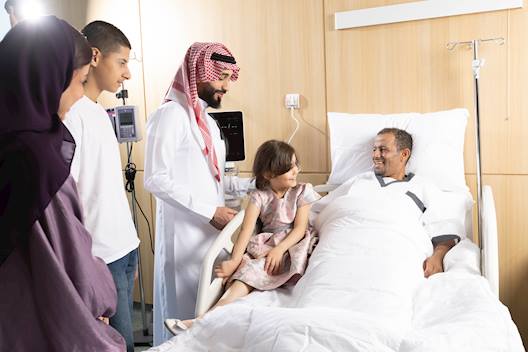Responsibility of Patients and their Families

- Familiarize themselves with their responsibilities and abide by the procedures and policies followed in the health facility, which are designed in accordance with the regulations, laws and medical and legal procedures to achieve the interest of other patients, and the community Also, to educate their visitors on their responsibilities and ensure their implementation.
- Protecting the property of the health facility and the property of others.
- The safe and correct use of the facilities and equipment in the health facility.
- Bring proof of the patient's identity.
- Giving complete and accurate information about the patient's personal, health and disease data.
- Inform the doctor of any confirmed or possible genetic diseases and of any Infectious diseases in contacts.
- Notifying health service providers of the patient's previous surgeries and his reviews of other health facilities.
- Report any change in the patient's health condition.
- Inform the attending physician of a lack of understanding of the treatment plan and prescribed interventions.
- Providing complete and accurate information about the patient's health insurance coverage and taking responsibility for it.
- Inform about women’s pregnancy status to protect them from the effects of radiation exposure and anesthesia and any procedures that may affect them or their babies.
- Inform patients about metal cardiac, or orthodontic during imaging that may affect their health.
- The patient or his family paid the bills that consequences of treatment.
- Follow the prescribed treatment plan, and in the event of refusal or failure to follow the instructions, the patient or the legal guardian bears the responsibility for this and the consequences and complications.
- Treatment of all staff and other patients and visitors with respect.
- Commitment to general rules and respect for the religious, intellectual and sectarian beliefs of others.
- Respect the privacy of others.
- Follow the regulations and guiding instructions of the health facility.
- Follow the safety and security regulations and instructions in the health facility.
- Commit to appointments and contact the appointments department in the event of not being able to attend.
- Commitment to implement the decision to transfer to another place or to leave as decided by the treating physician.
- Non-smoking in all facilities of the health facility.
- Informing the admissions officer, the staff and the medical staff involved in the treatment if he suffers from an infectious disease. This is due to the importance of taking global precautions that benefit those in contact and the medical staff without affecting his treatment, diminishing his rights, affecting his treatment plan, or isolating him without valid reasons.

